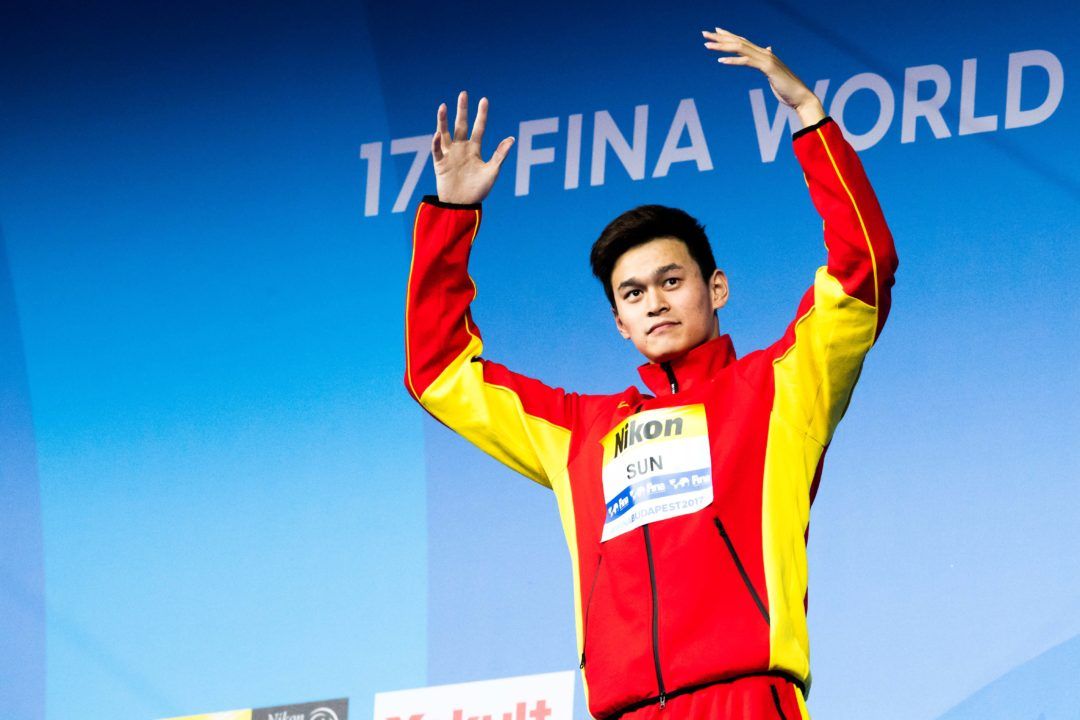Roughly 150 CAS cases have been appealed to the Swiss Federal Tribunal since 1992, writes FINA legal committee chair Darren Kane, and only “a single-digit percentage” of those appealing have succeeded.
Kane wrote an informative editorial in The Sydney Morning Herald last week, shedding some light on the specific procedural points of Sun Yang‘s appeal. The 28-year-old Sun is a three-time Olympic champ who earlier this year was banned for eight years over an out-of-competition doping test in the fall of 2018. During that test, Sun challenged the credentials of doping control agents, refused to provide a urine sample, and the conflict ended with someone in Sun’s entourage smashing a vial of blood.
Sun was originally cleared by an independent doping panel within FINA, but WADA appealed to the Court of Arbitration for Sport (CAS), which issued the 8-year ban to Sun, effectively ending his career.
Kane is the acting chairman of FINA’s legal committee, but in his editorial, he makes clear that he does not speak for FINA (the international governing body for swimming) and did not have anything to do with Sun’s doping case. Kane is also a sports columnist for the Herald.
Kane lays out some of the intricacies of Swiss law, and the potential avenues Sun has to get his ban overturned. You can read the full editorial here, but we’ll pull out key points below:
Appeals from CAS to the Swiss Federal Tribunal are rare – and not often successful. Kane writes that since 1992, only about 150 cases have been appealed from CAS to the Swiss Federal Tribunal, and only “a single-digit percentage of appellants have succeeded.”
Swiss law is the standard because the CAS is headquartered in Switzerland. Though Sun lives in China, and the incident in question occurred in China, CAS rules say that the court is headquartered in Switzerland. Its 8-year ban was issued in Switzerland, and Sun’s attempt to overturn that ban will be based on Swiss law governing international arbitrations.
There are five grounds for appeal, and Kane says only two are likely avenues for Sun. Kane immediately throws out three of the five grounds for appeal: cases where the CAS panel was improperly constituted, where CAS doesn’t have jurisdiction over the case, or where CAS makes an order that neither party was requesting. The remaining options would be (1) if CAS afforded the parties unequal treatment, or (2) where CAS violated one party’s right to be heard.
Sun’s CAS hearing was indeed marred by numerous issues with translators for Sun and many of his Mandarin-speaking witnesses.
The Swiss Federal Tribunal ‘remedy’ would be a new CAS trial. For those concerned that the Swiss Tribunal could completely clear Sun, Kane believes otherwise. He writes that if the Tribunal found that the CAS case didn’t give Sun the full ability to state his case, the outcome would be a second CAS trial, not an immediate judgement in Sun’s favor.

That’s good news that a successful appeal would result in a CAS retrial rather than a reduced ban